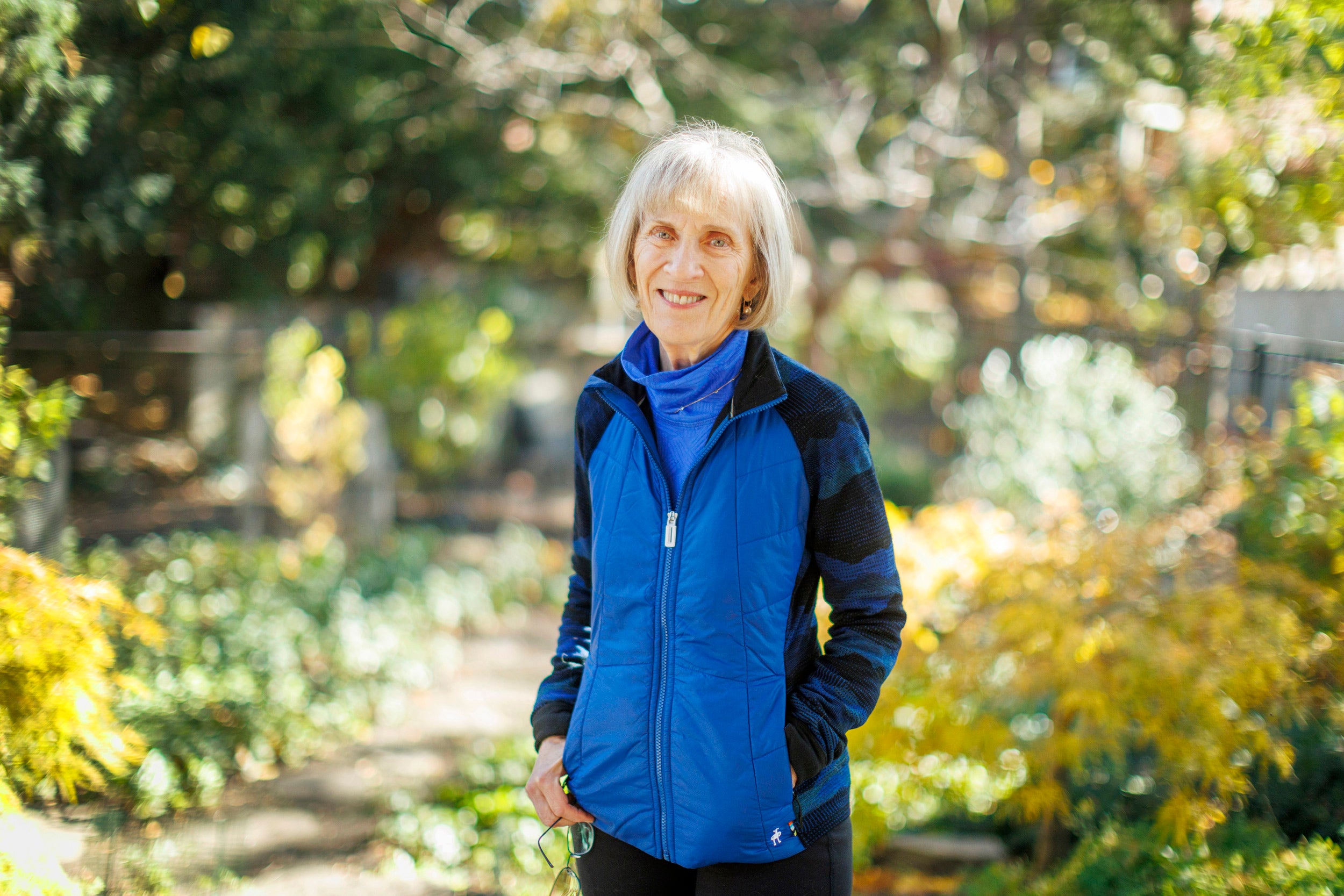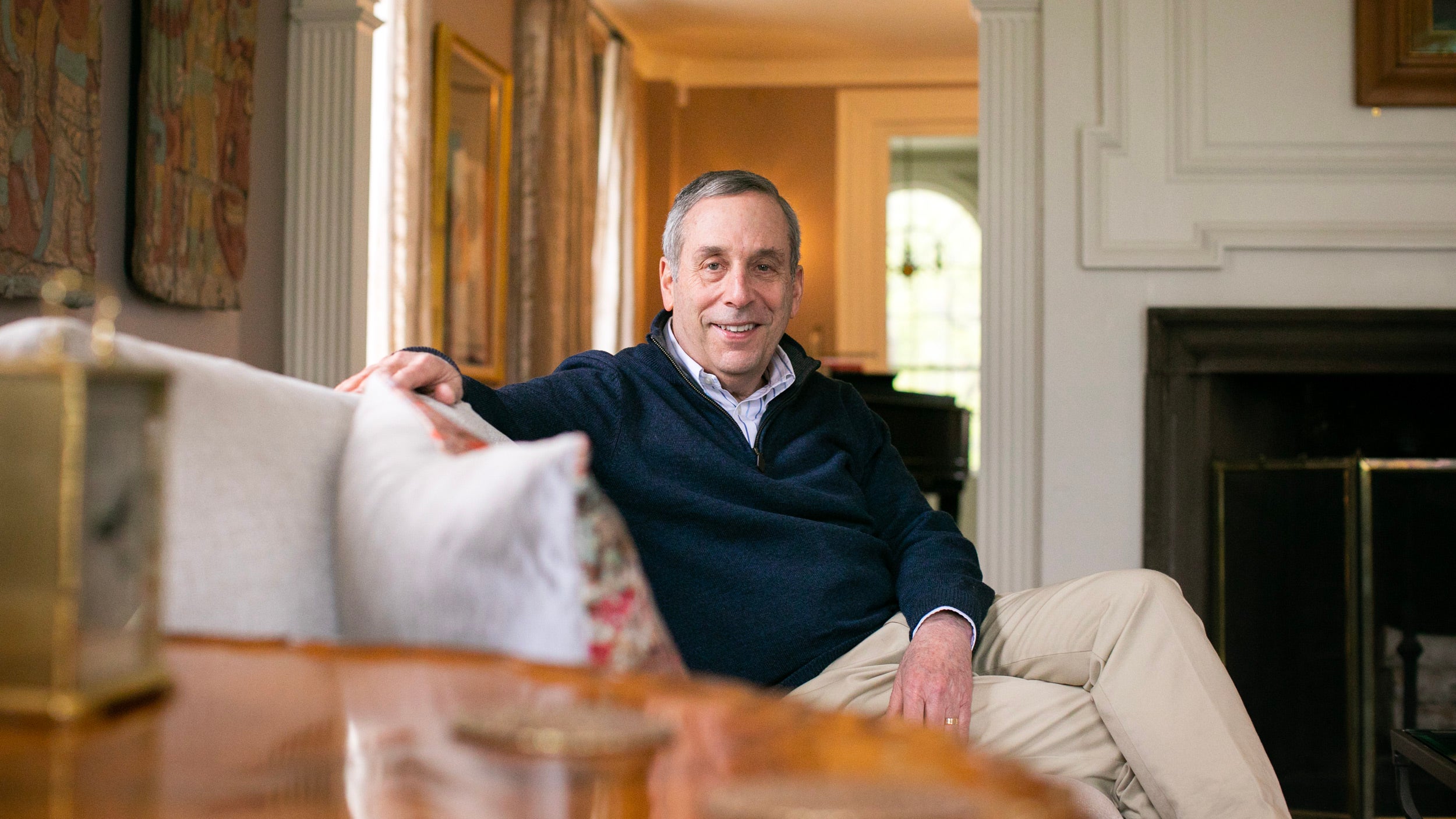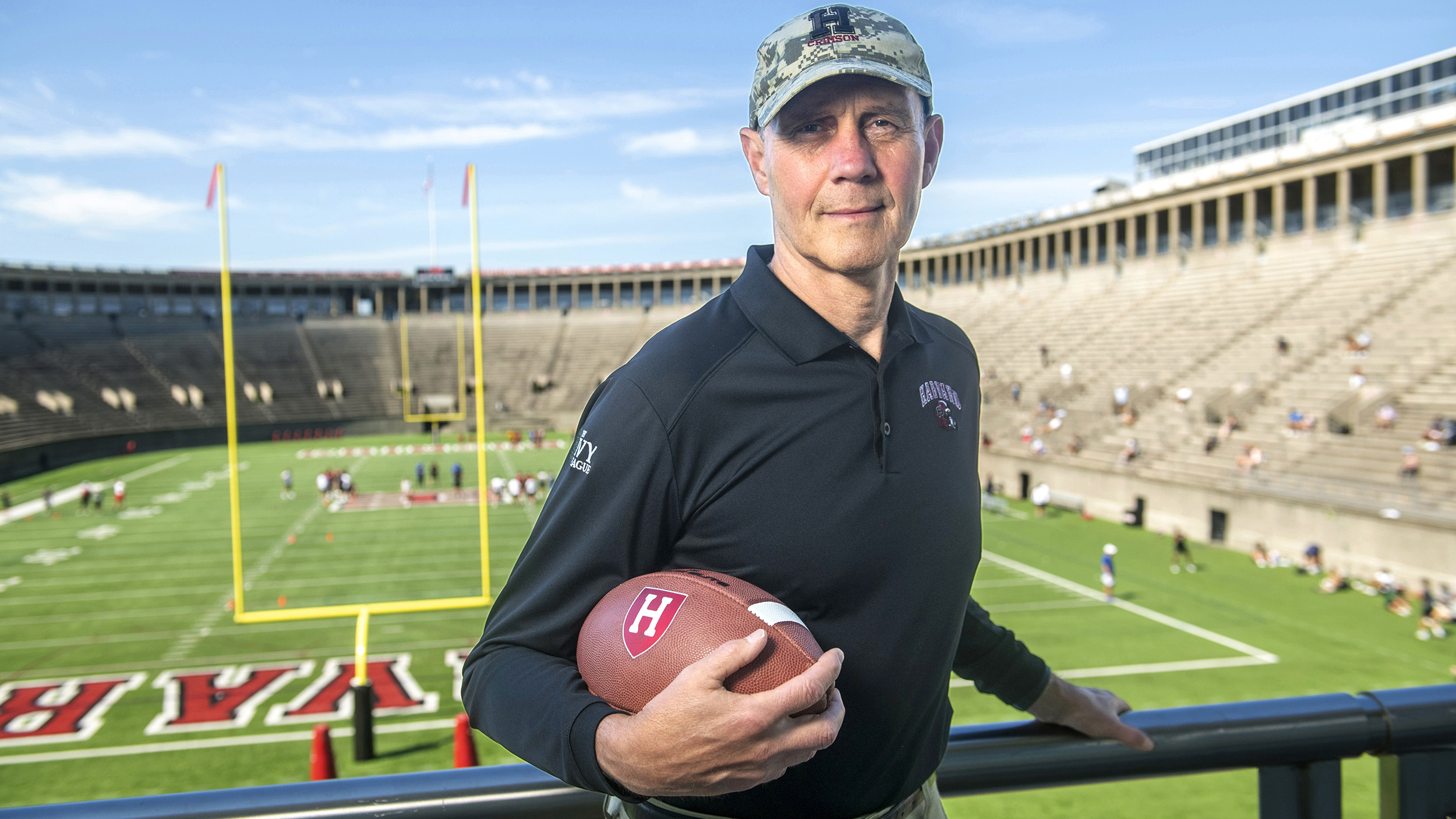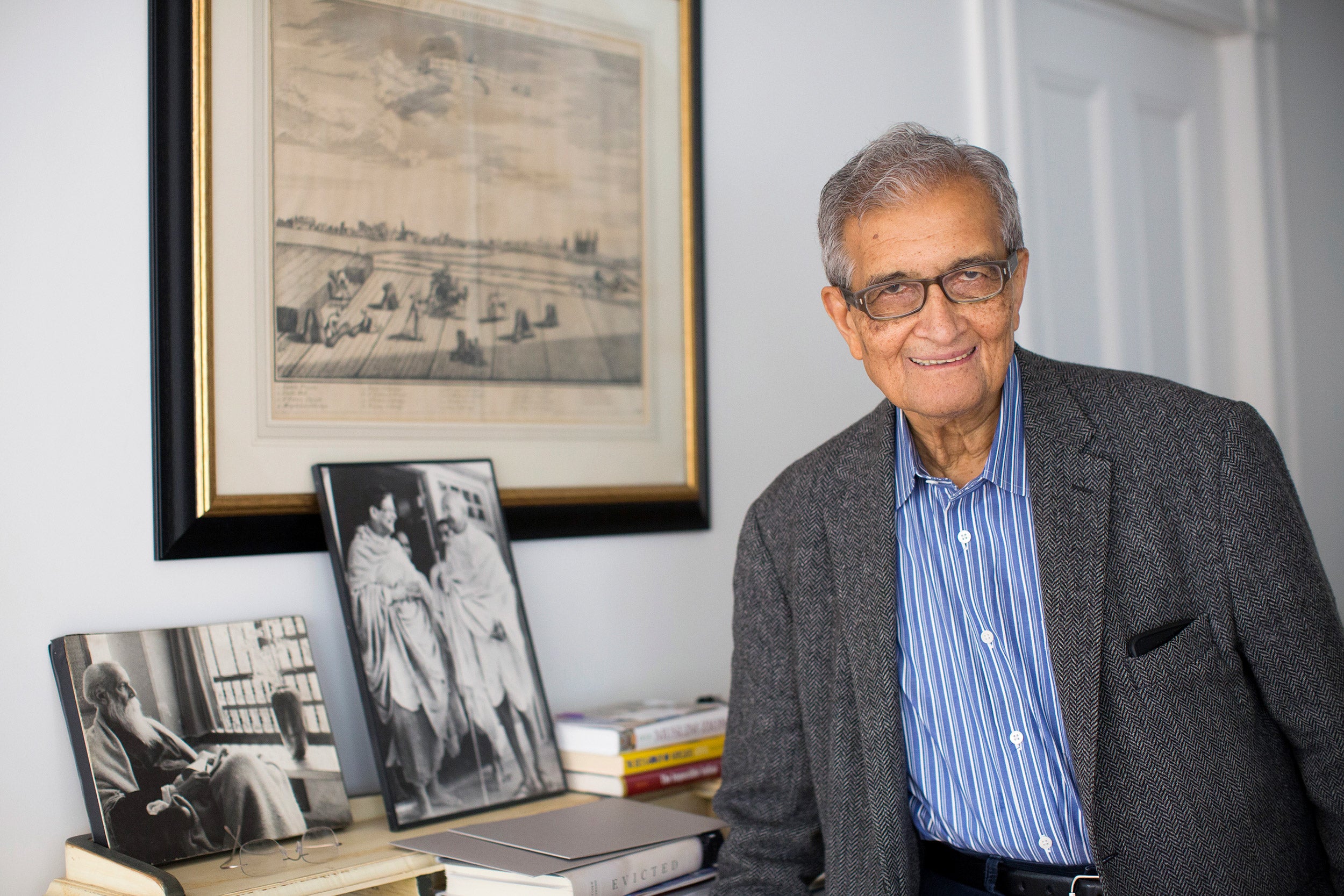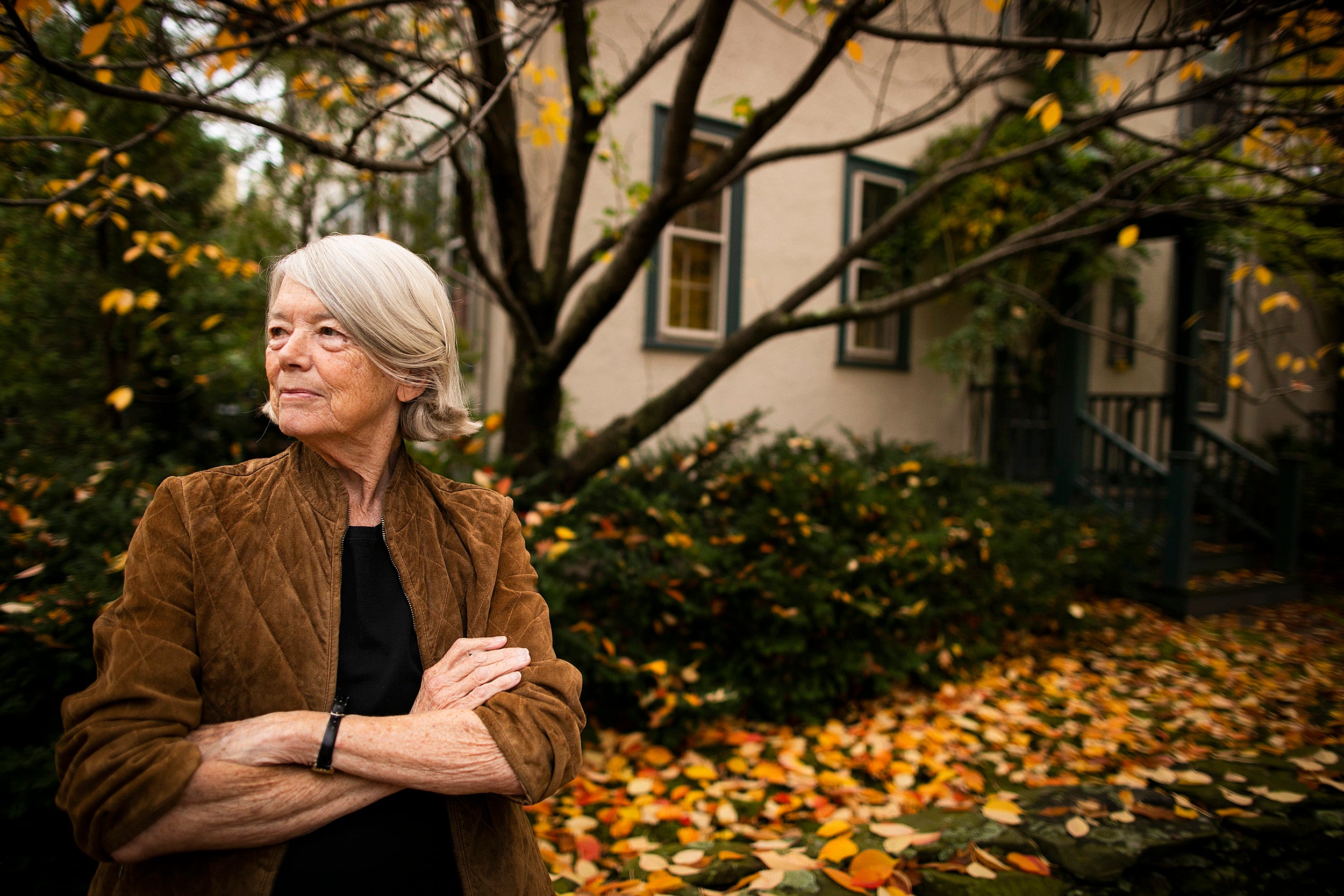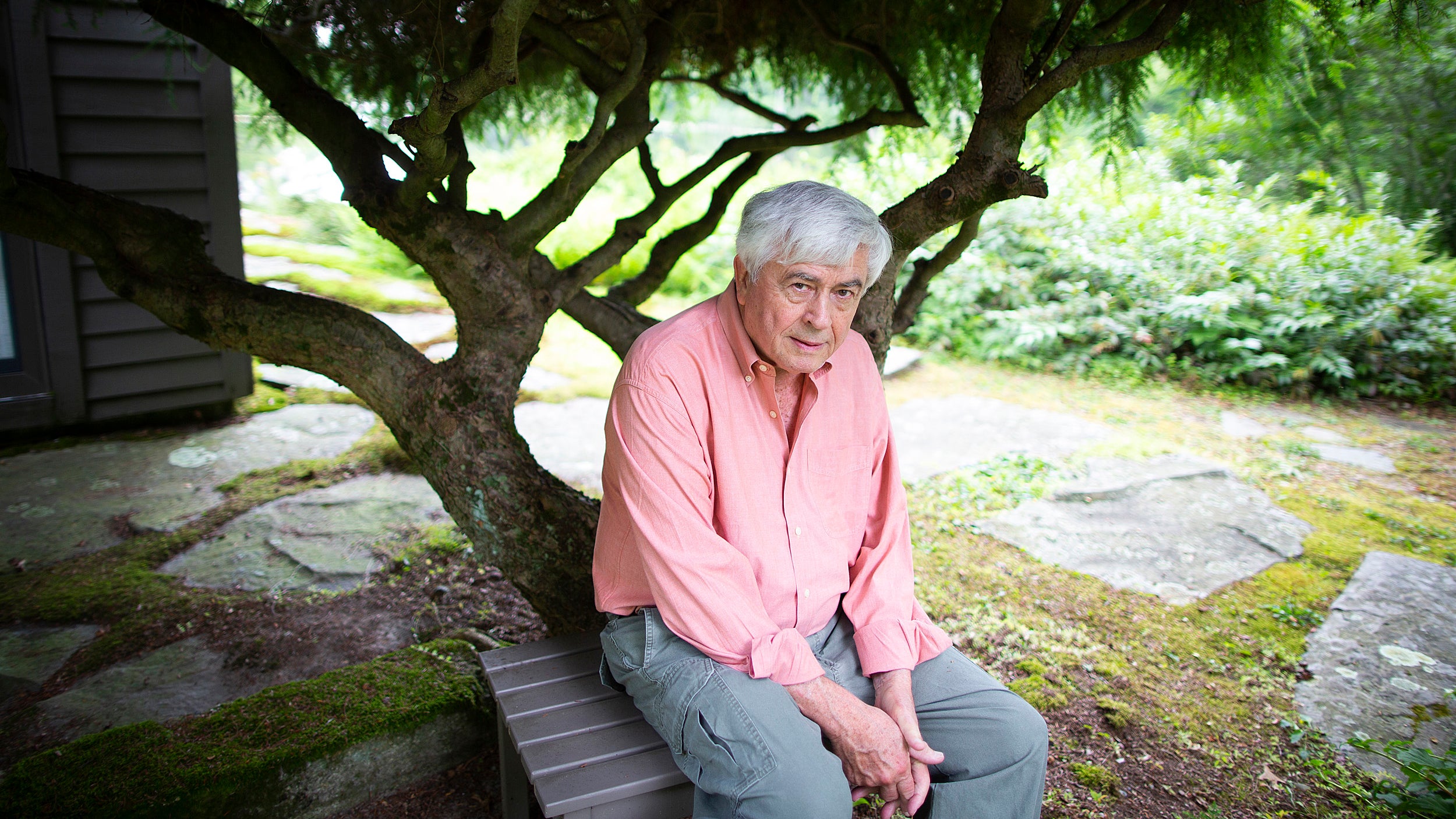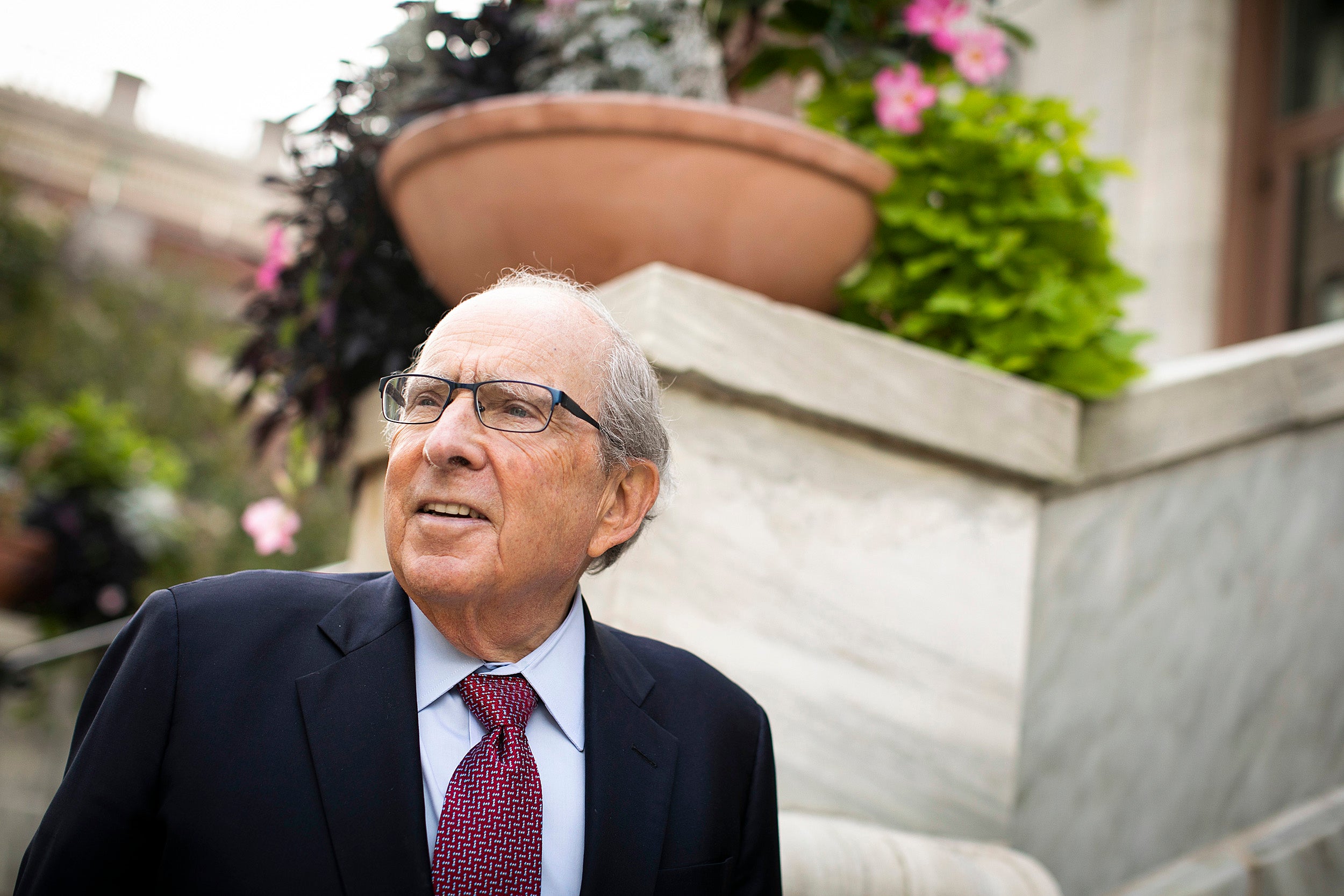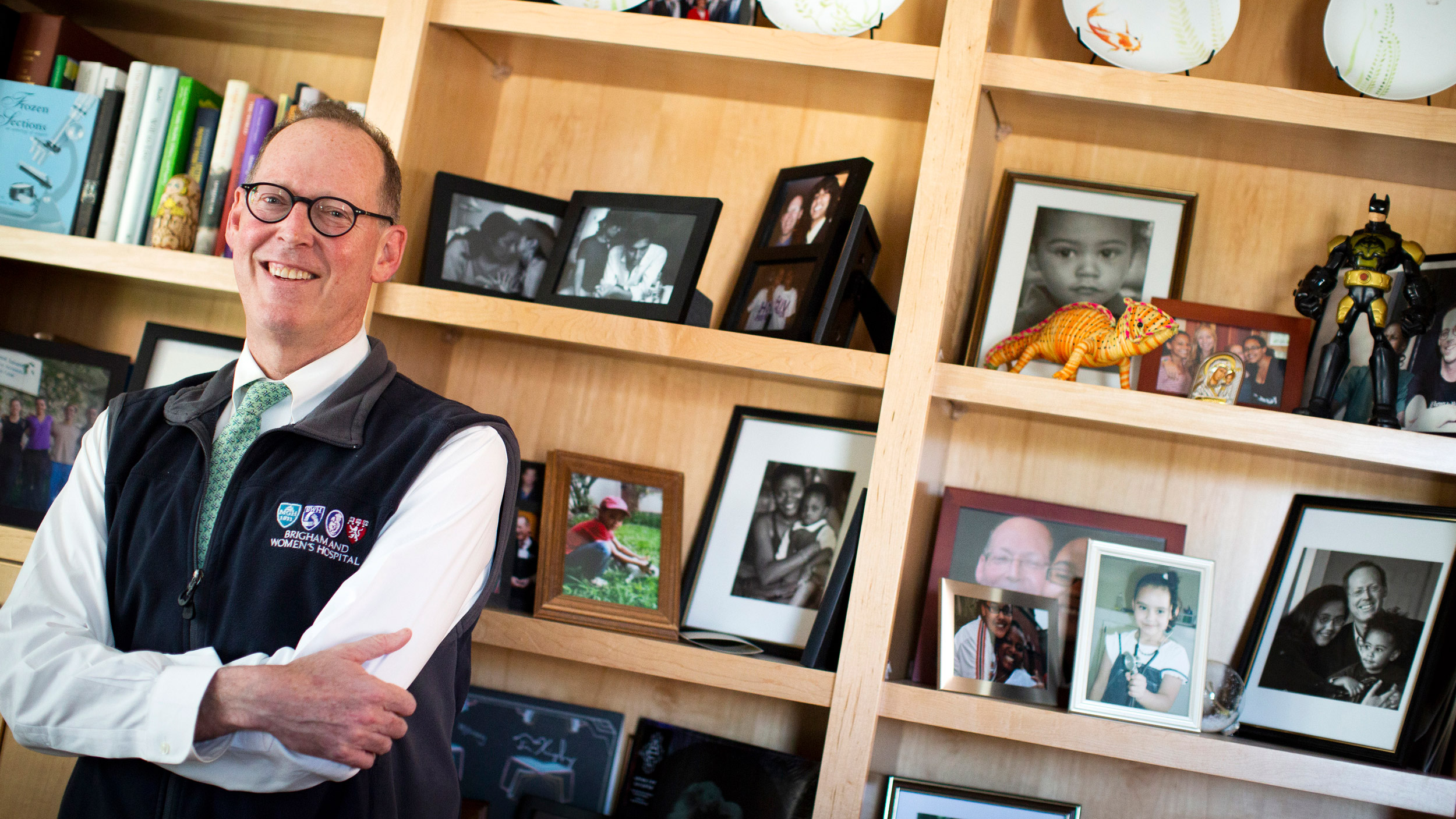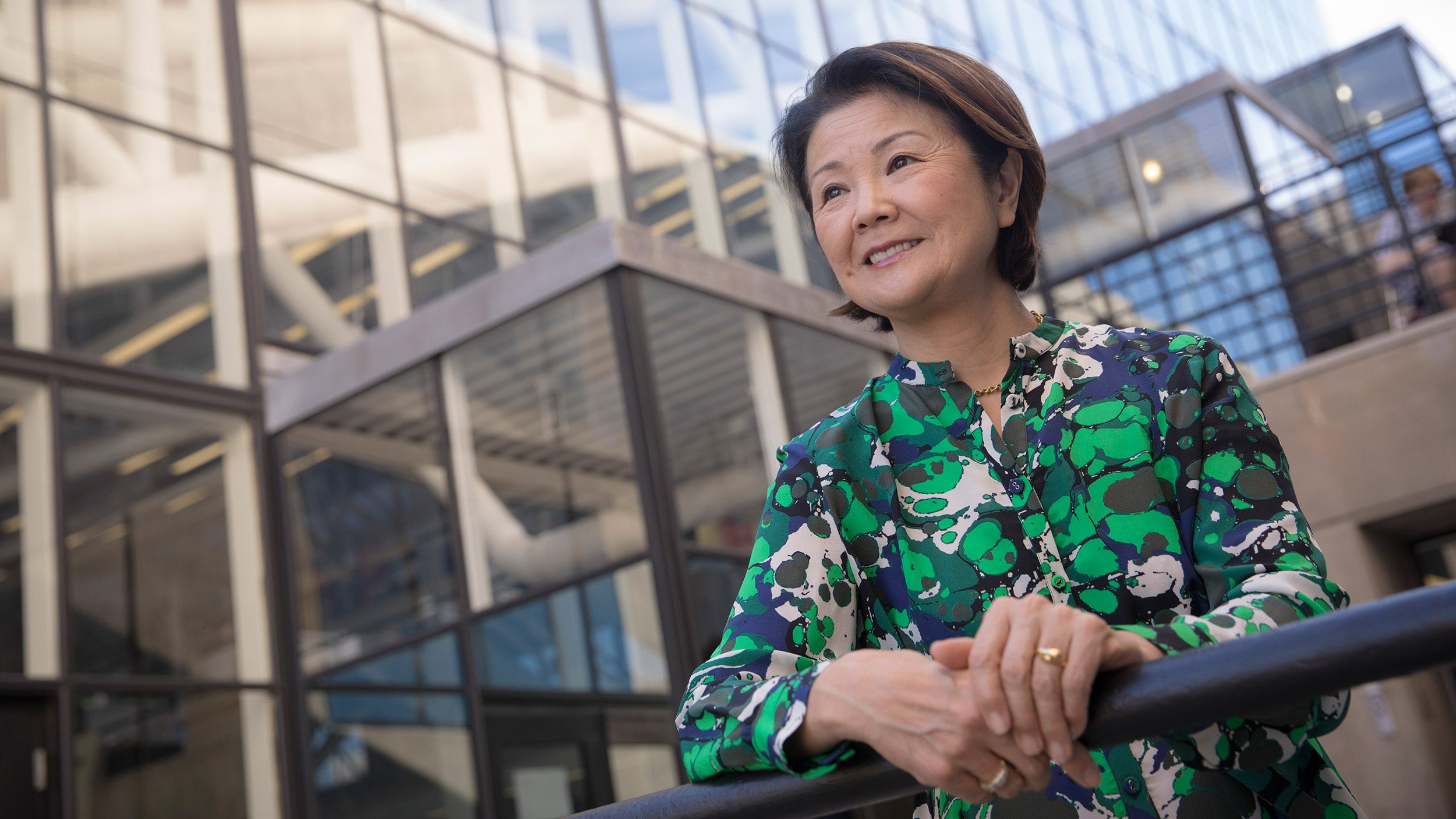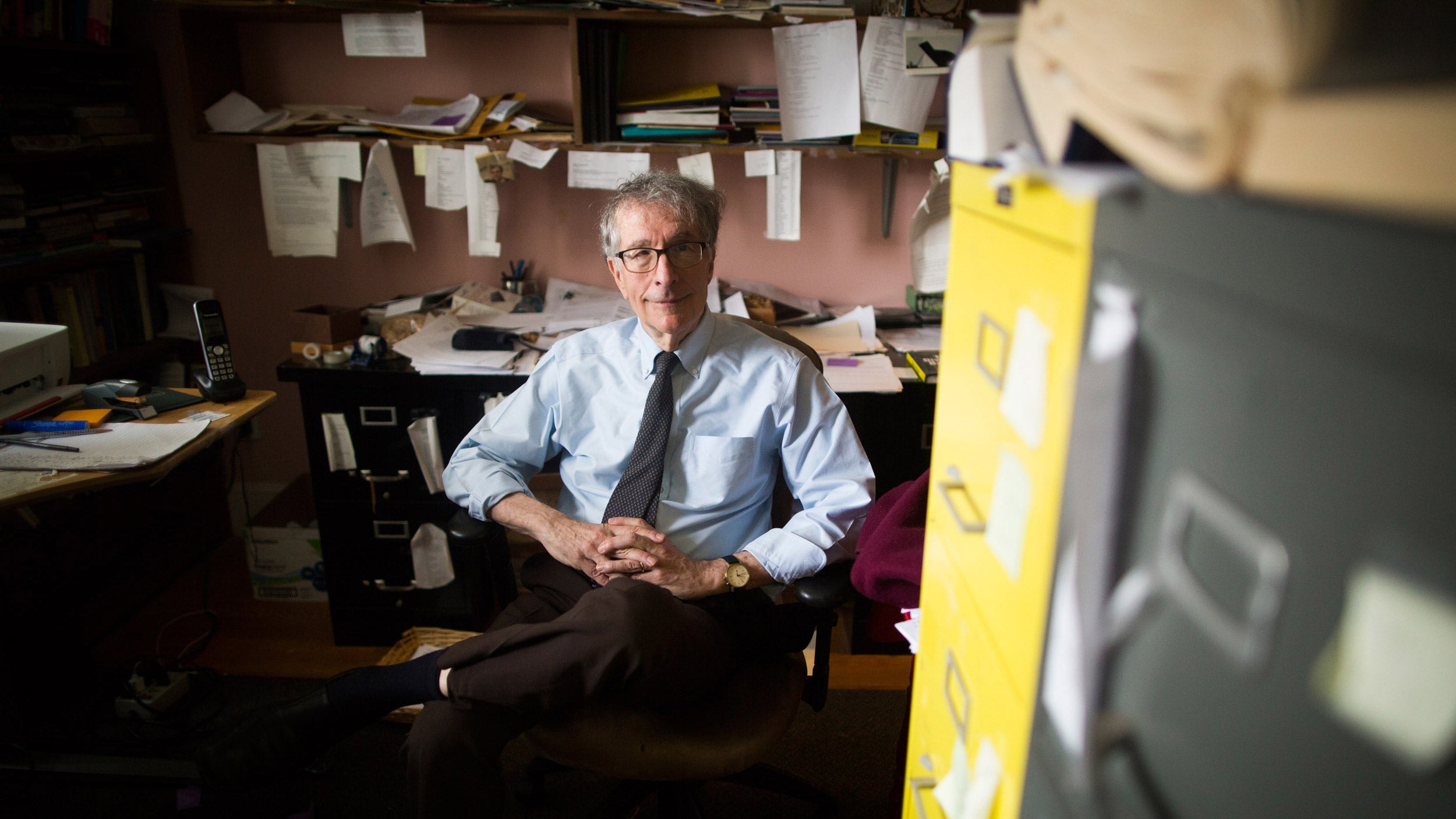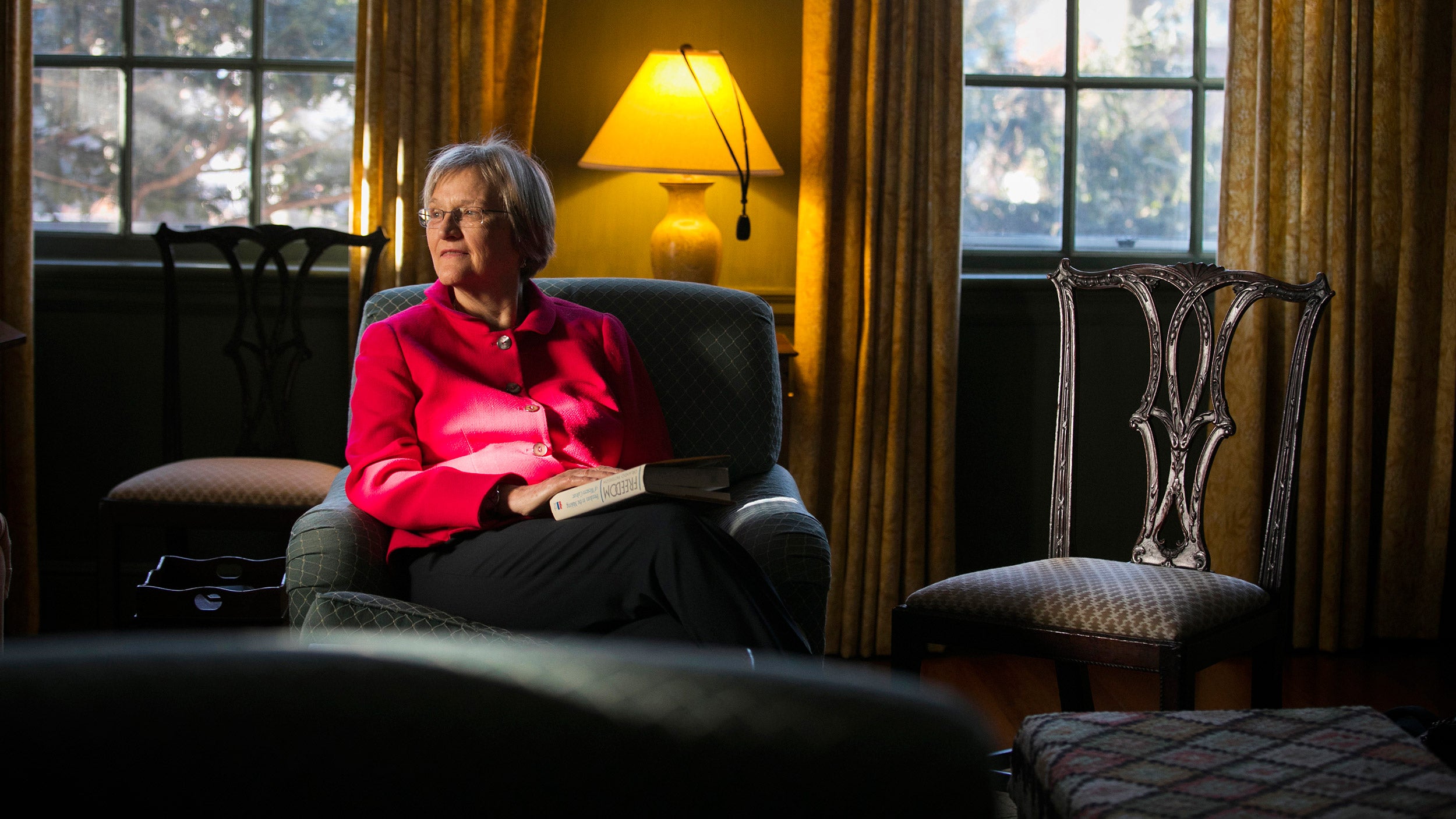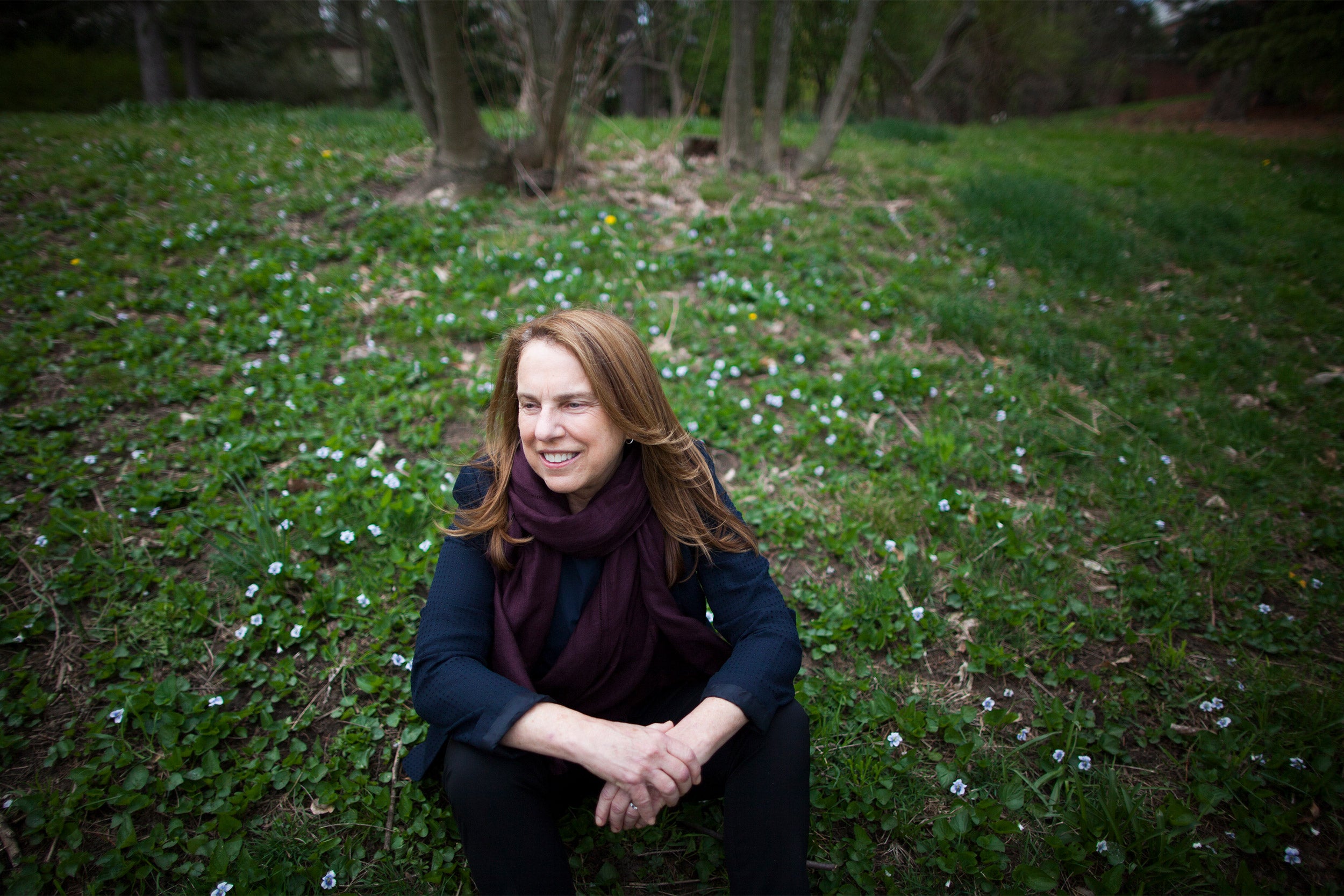
Stephanie Mitchell/Harvard Staff Photographer
‘I developed a sense of the enormous, great luck in managing to survive, giving me a strong feeling that I had an obligation to pay it forward’
As he prepares to retire, Laurence Tribe retraces his path from teen immigrant math whiz to leading constitutional law scholar and admired professor
Part of the Experience series
Leaders at Harvard in and out of the classroom tell their stories in the Experience series.
When he first arrived at Harvard College in 1958, the precocious but awkward 16-year-old was certain that mathematics was where he would make his name in the world. He appeared to be well on his way, blazing beyond his undergraduate coursework and finishing with top academic honors. But as the long-awaited door to a math Ph.D. swung open, the young immigrant, whose Russian Jewish family had left China for California right after World War II, found himself dissatisfied and inexplicably drawn to the study of law, specifically to the U.S. Constitution.
Now, 62 years later, Laurence H. Tribe ’62, J.D. ’66, retires from Harvard Law School (HLS), where he has taught since 1968. A popular and beloved teacher, Tribe’s courses have influenced generations of students, including Supreme Court Chief Justice John Roberts ’76, J.D. ’79, Justice and former HLS Dean Elena Kagan J.D. ’86, and former President Barack Obama, J.D. ’91. His canonical 1978 treatise, “American Constitutional Law,” transformed the field and helped put him on the course to becoming one of the nation’s foremost legal scholars.
Tribe has been a formidable advocate in high-profile cases before the U.S. Supreme Court and secured important victories in others, including one that established the press and public’s right to attend criminal trials and another that led to a ruling by the court that sexual activity between same-sex couples is a privacy right protected under the 14th Amendment. (Observers have noted that the majority opinion written by Justice Neil Gorsuch, J.D. ’91 in the recent landmark LGBT workplace-protections ruling closely tracks an amicus brief written by Tribe and Joshua Matz, J.D. ’12.)
As a trusted adviser to Democratic presidents and party leaders, Tribe has influenced nominations to the Supreme Court for nearly half a century, from the late Chief Justice William H. Rehnquist to Justice Brett Kavanaugh, much to the delight and dismay of partisans. On July 1, Tribe, 78, becomes the Carl M. Loeb University Professor and Professor of Constitutional Law Emeritus.
You spent the first six years of your life in Shanghai before your family immigrated to the United States. How did your family come to live there?
My grandparents were born in Belarus, and some of my great-grandparents came from Ukraine. My grandfather and father went from Belarus to Manchuria when my dad was just a teenager. My mother was born in Harbin, in Manchuria, in 1915. Her parents had come also from Belarus, so everything about my family reflects [the] movement of Russian Jews to the east. My parents met in Manchuria. My dad, when he was in his 20s, left China and came to the United States. He was in California for five years and became a U.S. citizen. He worked as a short-order cook and a car salesman. He went back to China, and then he and my mom, when the Jews were forced out of Manchuria, immigrated to Shanghai, which was the only place that would accept Jews. They got married in 1940. I was born in October ’41, in Shanghai.
Because my dad had long since become an American citizen, he was interned in a Japanese prison camp. When Japan occupied that part of Shanghai, the Brits and the Americans were “enemy aliens,” so they were all interned. My mother and I and my grandparents and aunts and uncles were left more or less to fend for ourselves. My mom was stateless at that time. When [my mother] was born in 1915, Manchuria was in the control of Russia. But when the U.S.S.R. came into existence in 1917, she lost her citizenship in any country, so we were not interned. My dad was in what amounted to a concentration camp. He was released right after the war was over, and then we managed to come to San Francisco.
What do you recall about your father’s imprisonment during the war?
He was a loyal and distinctly patriotic American. My mom gave him an American flag, which was hidden in the false bottom of a trunk that he had in the prison camp. He knew that if he were found out that he would be either tortured or killed, but he wanted to have that flag. When he died, my mom gave it to me. So it’s one of the things I care most about.
I visited the camp once near the end of the war when Japan was pretty clearly losing. I remember going in a very large rowboat across the river. I still have very distinct memories of that, even though I was only about 4, I guess. I remember being aghast at what it looked like. It was an old tobacco factory that had been converted into a prison camp. I still remember that they had empty cans under the legs of the beds. And when I asked my dad what the cans were for, he said that was to keep the rats from climbing into the beds with them. The roof was leaking—it was pretty grim.
How do you think that ordeal shaped you?
Well, it certainly gave me enormous sympathy for the experience of being a refugee, making me very sympathetic to immigrants. It made me feel incredibly lucky to have survived. The infamous Butcher of Warsaw [Josef Albert Meisinger] was known to have wanted to get rid of all the Jews in Shanghai. [He] didn’t succeed in persuading the Japanese generals that slaughtering us was worth the cost. But the so-called Passover plot was almost carried out when I was about 1. We were all going to be put out on boats, sent out to sea, and left to drown when the boats were deliberately sunk. So as I learned about things like this growing up, I developed a sense of the enormous, great luck in managing to survive, giving me a strong feeling that I had an obligation to pay it forward. All of that is part of, I guess, my character. Also, there was a sense of injustice. I always thought that it was unfair that my father was imprisoned — I kept asking, “What did he do wrong?” It was unfair that he was being taken to prison. I had no realization, of course, that that was the standard thing nations did with enemy aliens. And I suppose I trace to that early experience the sense that I wanted to make a difference.
Right after the war, you, your parents, and younger brother set sail from Shanghai on an Army transport ship, the General W.H. Gordon, and landed in San Francisco. That had to have been quite a culture shock for everyone. What was that transition like?
There were two or three men that my father knew in Shanghai who were imprisoned with him and then, basically, the whole community seemed to go to San Francisco. All of my parents’ friends when I was growing up were all Russians who had either become Americans or remained stateless. Mostly Russian Jews, but some Orthodox Russians, as well. So I grew up surrounded by people who spoke only Russian. And in fact, I spoke only Russian until I was about 8. At the beginning, we rented an apartment on Clay Street, in downtown San Francisco. Then, not long after, we moved to the Sunset District, not far from the beach. Most of the time when I was growing up, we lived in a two-bedroom rented apartment. But then somehow, my dad had a couple of good years, and we were able to buy a small house.

The house in San Francisco where Tribe grew up with his family, at 40 Dorchester Way.
Photo courtesy of Larry Tribe
What did he do for work?
He was a car salesman. In China, he sold Fords. In San Francisco, he sold Chevrolets, and then he “graduated” to selling Cadillacs. My mom was better educated than my dad, but neither of them went to college. But she was somehow admitted to a medical school in Milan, and she desperately wanted to go medical school, which you were able to do in the late 1930s without having more than a high school education. But my father and my mother’s father conspired to prevent that. She was an interesting woman. She loved Russian literature, although she was not particularly educated. She became a dental assistant.
It sounds like they adjusted pretty quickly. How was life back then?
It was touch and go. My father — many of his friends were much savvier business guys, and they had managed to save some money. He never did. Like me, I guess, he didn’t have much business sense or financial savvy. He was very reluctant to sell cars to people who weren’t wealthy because he thought they didn’t need them; they could use public transportation. He was well-known for persuading people not to buy Cadillacs. He said, “You don’t need a car like this.” And so, when my dad would leave home in the morning, we’d say, “Sell cars! Make money!” That was the mantra. And he would say, “Well, I’ll try.” Anyway, after 25 years there, they gave him this wonderful watch. I still have it somewhere. But it was not a watch given for being a successful salesman. It was a watch given to him because George — his name is George Israel Tribe — they all knew him as such a soft-hearted guy. He was not great at selling cars, but he was a great human being, so I was extra-proud of that watch.
What kind of student were you?
Tribe: I was thought of as the class brain, and it was not a compliment. At least in the earlier years, I was kind of unpopular because I didn’t want to speak English and, of course, the other kids in my public school didn’t speak Russian. Eventually, I figured that I had better learn. I don’t remember being discriminated against because of being Jewish. I went to a temple, had a bar mitzvah. I don’t know what anti-Semitism would have felt like, although I’m sure there was plenty of it. But I didn’t feel myself victimized by it. All I can say is I liked school, but I also was pretty rebellious. I have a report card from kindergarten when I was in the English school in Shanghai when I refused to speak English. The teacher said that even though he won’t speak English, he talks too much. He won’t be quiet. But I always did well.
I had trouble with arithmetic — not with mathematics, I love math — but manipulating numbers was never my strength. The kind of math I loved and excelled in was algebraic topology, very structural things, and my senior thesis was about the theory of n-dimensional knots in space. But despite that, I can’t find my way around physical space at all. I have no geographic sense even though I have a very right-hemisphere brain. I tend to think pictorially. I draw pictures. I do Venn diagrams. My students always enjoyed how I would scribble all kinds of diagrams on the board before class. You’d think, given that proclivity, that I would be able to find my way around. But right now, if you asked me where [the] bedroom is, I would probably point to the wrong part of the house.
Where did your interest in art come from?
When I was a little kid, I used to draw battleships and all kinds of — I still have lots of pictures of people in electric chairs. I was obsessed with electric chairs and battleships and cars and the guillotine. And they were pretty good, some of them. When I went to junior high school, I had a homeroom teacher, Mary Glunt, who was an artist, and she saw that I had some artistic talent. She’s the one who persuaded me to do an enormous mural that is still hanging in the library of the junior high school I attended in San Francisco, Aptos Junior High. I still have some of the nudes that I drew when I was about 12 or 13. She got my parents’ permission, and I went with her to a studio in downtown San Francisco, where we did drawings of live nudes. I really got pretty good at that. I’ve loved painting, but I haven’t done much of it in recent years. When I tried to take it up again a few years ago, I found it so frustrating, just the technique. All of it was so awkward. Somehow all of my creativity had been channeled into mathematics and into law, and apparently it drained out of the art stuff. Both of my kids are artists. They’ve never had much regard for me as an artist, and I don’t blame them now. I was good at the craft and could create highly realistic portraits and seascapes, but none of it was terribly creative or original.

Larry Tribe (left) with his mother, Polia, his father, George, and his brother, Alex.
Photo courtesy of Larry Tribe
Back then, what did you imagine yourself doing for a career?
I wasn’t sure. I thought I might want to be a doctor. My Jewish mother wanted her son to be a doctor. If not a doctor, then maybe a medical artist. Before photography was quite what it has since become, a lot of people did highly elaborate drawings of the insides of the human body. I did lots of that kind of stuff. I found and copied color photos of brains and hearts and livers. I did a science fair project that was mostly anatomical pictures. But my father had a very hard time earning money. I wanted at least to be somewhat comfortable, and his situation was, as I said, always touch and go. I thought I wanted to do something where I could at least be confident of earning a living and being an artist just didn’t seem to be that. Being a doctor? Maybe. But I had trouble with the experimental equipment in my high school chemistry course, and I really couldn’t stand my very first lab course. So it was pretty clear to me that medicine was not going to be it. The thing I really loved intellectually, from quite an early point, was math. I enrolled in a calculus course when I was about 12 or 13, a correspondence course at UC Berkeley, and I really loved mathematics. When I came to Harvard, the courses that I liked the most were math courses. I ended up doing graduate courses in math in my sophomore year, courses in abstract algebra and algebraic geometry and topology, and I was a grader in one of the graduate courses in my sophomore or junior year, and everything seemed just great. At that point, I thought I was definitely going to be a mathematician, and that was the direction that my life was going to go in.
I had a very unbalanced education at Harvard College. Nothing like the [General Education] requirements or the core curriculum existed at that time. I had esoteric courses in European intellectual history and comparative literature, but everything else was abstract mathematics. So I assumed I’d become a mathematician. But then a couple of things happened that made that seem implausible.
How did your parents view education? Was it always expected that you would go to college?
They were very enthused about it, my mother especially. She thought education was the most important thing. She always pressed me to work hard. They assumed I would go to UC Berkeley because at that time, especially when you were a California resident, Berkeley was basically free, and it was across the bay, and they didn’t want me to be very far from home.
But then I met this kid, whom I still know, Benn Sah. Benn and I were best friends. And in driver’s education, we were writing something on the board and he said, “So Larry, where are you going to go to college? Where are you applying?” And I said, “Oh, Berkeley.” He said, “What about Reed or Harvard?” I had never even heard of either. He said, “The place I’m really interested in is Harvard.” So he told me about Harvard. I thought it sounded pretty interesting. I liked the pictures of the brick buildings. It seemed pretty cool. (Laughs) He and I were the two top kids at the high school in terms of grades. We both got into Harvard, but I got a scholarship. He didn’t. He ended up going to Haverford, which was a great place for him, and I ended up going to Harvard, which was a fabulous place for me.
The first time I ever saw Harvard was the first day of my freshman year. I couldn’t possibly afford to come out here for a sample visit or for an interview. I do remember being interviewed by some very pompous Harvard alumni in San Francisco. I still remember them asking one question in particular. They said, “What do you think of Picasso’s second pink period?” I didn’t know. I knew who Picasso was by then, but I had no clue. I said, “Well, I don’t think it was quite as creative as his first pink period.” [Laughs]
Could you have attended Harvard without that scholarship?
No way. No way. Even with the scholarship, I had to work full-time in the summers, and I worked quite a few hours a week in the kitchen at Harvard Union, which is where freshmen ate. I served food. I washed dishes. No, I couldn’t possibly have come without a full scholarship.
You were only 16 as a first-year student. That’s quite young to be on your own and so far away from your family.
Yeah, it was a problem socially. For one thing, I found it hard to date because the ’Cliffies, as we then called them, liked guys who were older. I still remember going through the catalog and cold-calling various girls. It was really funny. But the other thing was my three roommates were so erudite compared to me. One of them had gone to Horace Mann; one had gone to Bronx High School [for Science]; one had gone to Phillips Exeter or something. They all spoke German, and they all knew Gilbert and Sullivan. I was scared [expletive] of them all. I thought they were Nazis, and they took advantage of how naïve I was. They would talk German, and I would cower in the bedroom. It was horrible. My parents saved the letters that I wrote home saying, “I’m going to flunk out. Can I come home? Can I leave? I think they’re plotting to get me.” I was very afraid that I wouldn’t do well at the start of the fall semester, but it turned out I was either first or second in the class at the end of the freshman year. My mom saved both the letter that I wrote home at the very beginning saying, “I think I’m too ignorant and unsophisticated for this place. I’m not going to make it,” and the letter I wrote at the end when I said, “It turns out that someone else is first in the class and I’m second.” I was so sad that I didn’t end up being first. My mom said, “I will always love you, sinochka, but I liked you much better at the beginning when you were afraid that you wouldn’t do well than when you have the gall to be upset that you’re only second out of a thousand.”
Who were some of the people you studied under back then?
Andrew Gleason was one of the main people. He solved Hilbert’s fifth problem. John Tate, who only recently died at 100 or something; Lars Ahlfors, who was the great theorist of functions of a complex variable; Shlomo Sternberg, who was in topology. They were my mentors, and I was just completely enamored of the way their minds worked. The other people who were in math at the time with me, Shankar Sen, who’s now a professor of mathematics at Cornell; Gene Lewis; and principally Saul Kripke, who was in mathematics as well as also, mathematical logic.
Saul and I were friends, but I didn’t realize at first how much more advanced than me he was until we took this course from a Wittgenstein scholar named David Pears. It was a graduate seminar, and we were the only two [undergraduate] students enrolled in it. The first paper that was assigned was something that Saul turned out to have written when he was in high school in Nebraska. He is pretty much the inventor of modal logic and a number of other things. At the time, he was thought to be the Bertrand Russell of his generation. It took me a while, but I eventually concluded that it doesn’t make sense to go into higher mathematics and metamathematics unless you are an absolute genius and will transform the fields themselves. Because otherwise, big deal. You’re not going to help the world, and you’re not going to discover anything significant, so what does it mean to do it? So I kept looking for something, some way that I could both do well and make a difference.
I spent a year working toward a math Ph.D. at Harvard under a National Science Foundation Fellowship, and I had taken just about every graduate course there was, and to the extent there were anything like general studies courses, that was behind me. So it was just the thesis, and I was starting to think about it. But then I realized in a dramatic way, “I can’t spend my life this way.” Because in the past when I had done math, it was always leavened with a course in comparative literature or with something that added a human touch to my education. But just communicating with the blackboard for the rest of my life just seemed like an impossible thing.
In addition to the thought that I couldn’t compare with guys like Saul Kripke and wouldn’t discover anything truly fundamental, and I would be off in a kind of silo having nothing to do with the world, and I couldn’t talk to people about what I was doing. I was already doing the kind of math that only J.P. Serre in Paris and John Tate, here, were doing.
The other thing that got me was that I like language, and I like communicating. But in pure mathematics — maybe I was wrong, but the way I saw it — communicative facility was a sign of shallowness. The math department used to be on Divinity Avenue. I remember they would have teas over there, and I’d join some of the mathematicians for tea. I still remember when John Tate couldn’t remember the name of a teacup. He would say, “Would you like a — a —” and he would hand it to somebody. And everybody around would go, “Ooh.” You could tell they were thinking: “The very fact that he couldn’t remember the word ‘teacup’ shows he’s deep.” And I thought, such [expletive]! This just isn’t for me. My abilities lie in the direction of human communication.
You felt like your world was just going to get narrower and narrower?
Right. The first half of my one year on an NSF fellowship, I had all A’s in everything. Second half, all incompletes. At Harvard, there’s nothing worse than an incomplete. That’s worse than an F. I didn’t show up for the exams. I just couldn’t stand it. So I knew I had to leave. And so, I went to San Francisco, worked at the Lawrence Radiation Lab, was desperate not to continue working on the Ph.D.
I had applied, on a kind of lark, to the Law School, but I was late. I missed the application deadline and ended up on the waiting list. I didn’t know what to do. Then, late in the summer, I got an old-fashioned telegram, which I still have, saying I’d been admitted to the Law School. So I came to Law School.
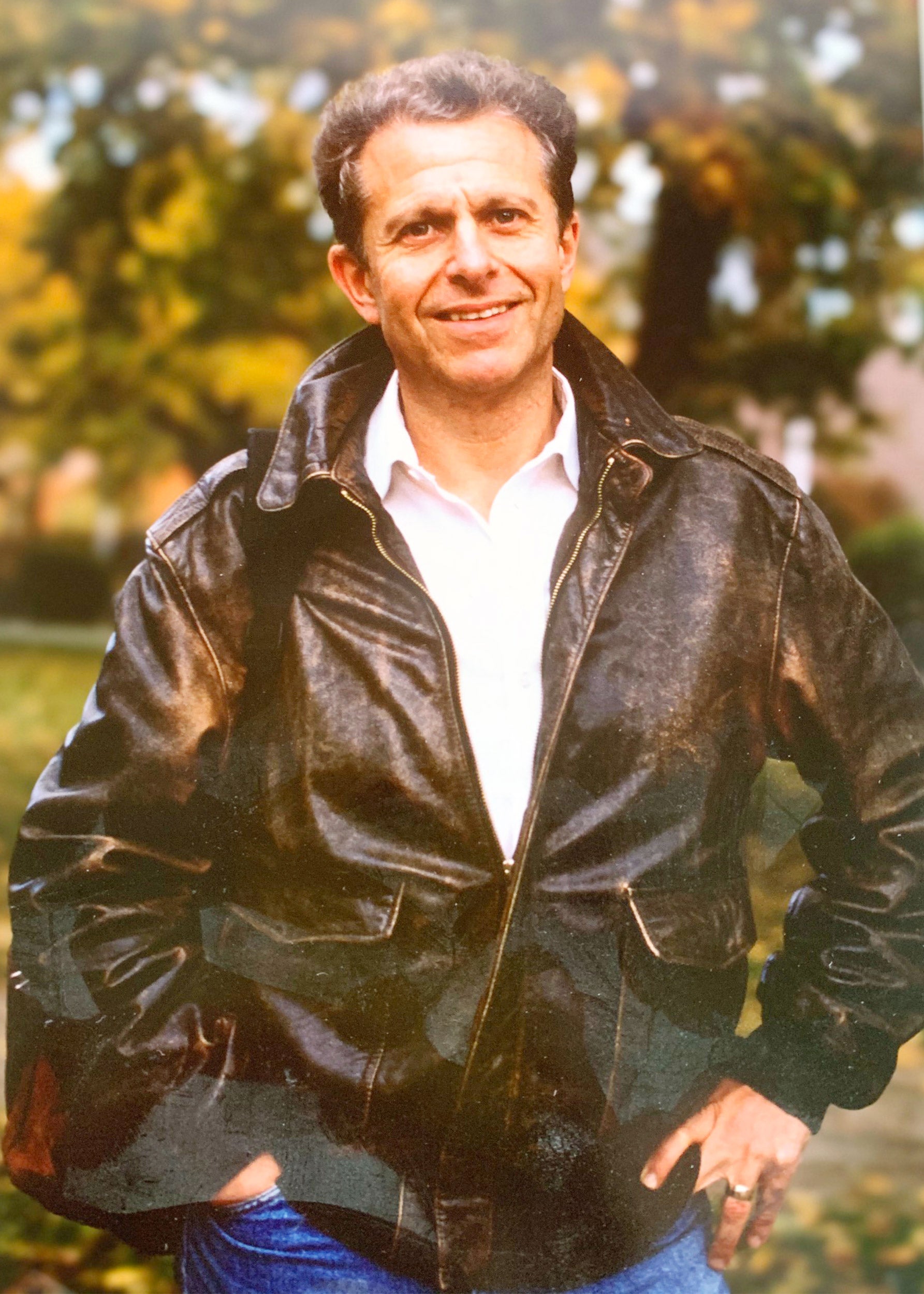
After being immersed in math for so long, how did you find Law School?
I had mixed feelings. I loved the ideas, but I didn’t like all the classes. At least some of the classes were kind of deadening. A lot of the professors were extremely nasty. They were nasty to women, in particular. There were only a few women in the class, but they would have a “ladies day” when they would call only on women. It was very unpleasant in that way, and there was a lot of this humiliation stuff. So I didn’t like to go to class. I missed a lot of classes, but I loved the ideas.
I was part of a little study group, and we did a lot of work together. I didn’t do quite well enough in the first year to make Law Review, but then I ended up doing really well in my second and third years. And I remember loving parts of it. I loved Civil Procedure with Paul Bator. I loved Constitutional Law, had Paul Freund for an advanced Con-Law course. I loved that. I loved Conflict of Laws with David Cavers. I absolutely loved Administrative Law with Louis Jaffe. I loved Federal Courts with Henry Hart. A lot of these people are still people that I pretty much idolize in hindsight.
The people I really liked as law professors were not the self-important, nasty ones. But it was a very uniform place. It was very monochromatic, almost no minorities, just a small smattering of women, and much more rigid. Not interdisciplinary, not nearly as experimental and open-minded and conceptually adventuresome as it became in later years. There was a sense that there were right answers. Having come from mathematics, I felt particularly strange about how this isn’t like mathematics where you have absolutely wrong answers and right answers, and you can say Q.E.D. But they didn’t seem sufficiently aware of the open-ended nature of the inquiry, so I yearned for more. Still, my overall sense of it was it was a great place. Not nearly as great as it has become, but great anyway. I have so loved teaching here. It’s just amazing.
Who was the Larry Tribe of that era?
I don’t know how to answer that. In recent years, the last 20 years or so, there’ve been student ratings, a lot of emphasis on how well you teach. In those days, everything was word of mouth, but people didn’t care that much what students thought. So some students flocked to particular professors and loved them, like Paul Freund or Archibald Cox. Some students liked flashy professors who were very entertaining, like Arthur Miller, who’s now at N.Y.U. Certainly, in constitutional law, it was pretty staid. Paul Freund was wise and experienced, but many of the people who taught con law — for example, my con law professor in the main course was a guy named Ernest Brown. The whole course was all about taxation and commerce. It wasn’t about free speech; it wasn’t about religion; it wasn’t about separation of powers; it wasn’t about impeachment. Still, I loved it. I learned a lot about how to think about the Constitution’s text and structure and about the decisions interpreting it in various ways, but most students were kind of bored. So many of the students were careerists in those days. They’d flock to courses in commercial transactions and taxation, and I wasn’t ever too interested in that. Although, come to think of it, I did really enjoy my course in federal income taxation with Professor Bernard Wolfman, who was visiting from Penn.
What was it about the Constitution that really captivated you early on, that prompted you to decide, “This is what I want to do”?
Where else could you find the combination of something making a difference, something of consequence, something truly fundamental, something that is at the base of everything, but also something that has a deep history and something in which there’s extraordinary writing and thinking — The Federalist Papers, some of the great opinions of justices, Thurgood Marshall’s lawyering, John Marshall’s writing, Robert Jackson’s mastery of prose? It’s a combination of literature, history, moral philosophy, political philosophy, and structure.
What I like about mathematics is that it’s about the way things hang together, the architecture, the structure of it. I’ve never so much liked the numbers, but it’s the structure. And the structure of separated and divided powers and the way rights and powers and responsibilities relate to each other. If you like and love literature and interpretation, as I do, where else could you find something where there’s a detailed, but spare, text, on the basis of which so much is built?
I’m also absolutely fanatical about silence. I love silence and gaps. One of my articles that I’m proudest of is called “Soundings and Silences,” and one of the books that I like best of the things I’ve written is called “The Invisible Constitution.” It’s very much about seeing things in the spaces between, the syntax of the unsaid. What are the various ways to interpret the silences? Constitutional law is filled with great silences. It’s just the bare outline, and everything else has to be built up. So it’s almost unimaginable to me that anyone would be as interested in teaching or learning anything else.
When did you realize not only was this the career path for you, but that you wanted to teach, not join some white-shoe firm?
Well, I wasn’t so sure, but I loved the ideas enough to think if I ever could teach law in an interesting place, that would be great. But I didn’t really imagine that would be an open path. When I got one clerkship after another, first the California Supreme Court and then the U.S. Supreme Court, then it began to be a possibility. I thought the idea of coming back to the classroom writing, teaching — that sounded exciting. But I didn’t think it would happen.
You talked about how your family struggled financially when you were younger. How did a career teaching the law go over with your parents?
My parents were not so happy that I chose to teach because I had law firm offers, and they were going to pay way more. As long as I had enough to live on, I didn’t ever care about getting rich. I just wanted to be reasonably comfortable. It wasn’t easy. The starting salary at Harvard Law School [in 1969‒70] was no more than $16,000, if that. But I wanted to do something that was practical in the world. Something that turned me off about Yale that they thought would attract me was that one faculty member there after another said, “This is the ivory tower. This is where your mind will flourish. Go to Harvard and you will end up doing government consulting. You’ll end up arguing a case every now and then. Your mind will rot.” And I thought, “No! One reason I chose law rather than mathematics is that I could have something to do with the world.” So I turned down Yale’s offer to teach and accepted Harvard’s.
After graduating magna cum laude from HLS, you clerked for Justice Mathew Tobriner on the California Supreme Court in 1966‒67, and then for Supreme Court Justice Potter Stewart in 1967‒68, just after he had dissented on two significant civil rights cases, Miranda v. Arizona and In re Gault. Shortly after you start, Justice Thurgood Marshall joins the court. Some major cases were decided during that term on law enforcement’s power to stop and frisk (Terry v. Ohio) and Fourth Amendment rights against warrantless government wiretaps (Katz v. United States). What was it like to clerk for a justice whose politics were so different from your own?
I didn’t detect that big a difference. Take Katz, for example. Justice Stewart agreed with me that ideally electronic surveillance would be treated as a search and would require a search warrant. The difference was I thought we could actually get a majority of the court to agree on a specific approach. He said, “Larry, you’re being immature. You’re new here. You don’t know what you’re talking about. This is not going to go this way.” I almost got fired by making an ass of myself. I said, “Give me a chance, Mr. Justice. I think I can write a memo over the weekend that can command a court.” He said, “Well, be my guest.” And I did, and that’s what happened: The draft I wrote became the opinion in Katz. But it’s not as though Justice Stewart didn’t agree with me in principle. From the very beginning, he thought that electronic surveillance ought to be regarded as a search and that the court’s prior holdings — unless you actually physically invade someone’s space, you’re not engaged in any activity that should be subject to Fourth Amendment control — he thought that didn’t really make sense. But he thought that we were stuck with that precedent, and he was very much somebody who believed in precedent. So that was a wonderful experience. It was wonderful that he was open enough to try it.
“Where else could you find the combination of something making a difference, something of consequence, something truly fundamental, something that is at the base of everything, but also something that has a deep history and something in which there’s extraordinary writing and thinking?”
What was it like to be a Supreme Court clerk back then?
Well, it would depend. If the justice liked your style, as Stewart liked mine, you got to draft lots of opinions. They go through quite a process of winnowing in the hiring process. Now each has four clerks. In those days each justice, except for the chief, had only two law clerks. If you hit it off right with the justice and are good at arguing back and forth and write in the style the justice likes, you got a lot of drafting experience. I drafted a dozen opinions for Stewart, and some of them, including Katz and Jones v. Mayer, which was really important [it held that Congress could regulate sales of private property, such as real estate, to prevent racial discrimination], came out pretty much as I wrote them. It was just an exhilarating experience. And the other law clerks were wonderful to work with. It was much more collegial in those days. Now, as I understand it, it’s nine separate law offices.
Were you able to get to know any of the other justices besides Stewart?
Yes. I got to know Marshall quite well and [Earl] Warren less well. I remember a hilarious experience with [John Marshall] Harlan, in particular. In those days, the Supreme Court had its own theory that explicit sexual material could be banned if it was sufficiently hardcore, whatever that meant. Stewart famously said, ‘I can’t define hardcore pornography, but I know it when I see it.’ And I asked him once, “Have you ever seen it?” And he said, “Yes, just once, off the coast of Algiers.” (Laughs) I could never find out more than that.
We used to go to the basement of the court to watch porno flicks because the court was in a phase where it would just have to judge — thumbs up or thumbs down — either this is hardcore pornography and can be banned, or it’s not. They had no criteria. They just basically looked at the movies. Harlan was going blind, and so he had Thurgood Marshall narrate the films. “Oh, he’s doing that? You’ve got to be kidding!” That was the screening process.
In 1978, the first edition of “American Constitutional Law” is published and becomes the most frequently cited legal text from the second half of the 20th century, according to The Journal of Legal Studies. How important was that to your career?
Until I ended up writing and publishing a treatise on constitutional law, I was never asked to argue major Supreme Court or other cases. That’s what changed everything. I taught constitutional law and realized that people hadn’t systematically tried to integrate the subject in a coherent, cohesive way, so I ended up having to write my own outlines of things. I wrote a 5,000-6,000-word outline that I began handing out to students. Eventually people said, “Well, why don’t you turn this into a book?” I had no idea how challenging it would be. Nobody had really done it for 100 years.
I skipped my first three sabbaticals, foolishly, thinking that they would accumulate. So I was teaching full-time, but also writing full-time. This was 1976. There was a boiler room in the basement of Langdell Hall, and that’s where I worked late into the night or the early morning on that book. Much of it is a first draft. How the hell I did it, I have no idea because it’s thousands of words and thousands of footnotes. I was always klutzy, so I had a really hard time figuring out how to change the cartridge on the IBM Selectric [typewriter]. I would type into the night, and the thing would run out of tape, and I was beside myself. So [HLS] Dean Al Sacks came up with this idea of renting me a bunch of typewriters. (Laughs) There were 11 typewriters in a row, and I would go from one to the next as the tape cartridges would run out.
Of all the things you’ve done, first and foremost, you’re known as a beloved teacher who has influenced and inspired generations of students, lawyers, judges, scholars, political leaders …
I love hearing that. That’s what I’m proudest of.
What do you love most about teaching?
I love the learning part of teaching. I love how much I can learn from the interaction with students. I love the sparkle in the eyes of students when an idea suddenly gels. I love being able to help students make sense of things. And then I love the fact that they’re going out into the world and doing something with it. I may not even agree with what they’re doing, but the fact that I’m helping them take flight, I just love the experience. And I love hearing back from them over the years and keeping in touch. It’s the same as what I have always heard about being a parent — that you have this family that goes out and affects the world. And the feedback you get, both immediately — students letting you know that they appreciate that you care about them and that you’re making things clear for them — and then hearing from them 20 years, 30 years later, and then teaching the children of the people you taught, is just the greatest and most gratifying experience. And I love the fact that if you do some outside stuff like Supreme Court arguments or testimony or help to write laws, that can feed into your teaching, and your teaching can feed into that, so that it creates a kind of an integrated life. You’re not fragmented into silos. I love that teaching can become a part of the rest of your life.


Laurence Tribe with President Barack Obama in 2010. A document signed by Obama and Hillary Clinton is framed in his home.
Photo with Obama courtesy of Larry Tribe. Document photo by Stephanie Mitchell/Harvard Staff Photographer
You’ve taught thousands of people; quite a few have gone on to accomplish lots of things in different arenas. Former President Obama is always a noted example. Do you feel kind of a pride when one of your former students is successful or does something consequential?
Oh, yeah. I do. I’m not proud of all of them. [Sen.] Ted Cruz, I’m not so proud of. But I love the fact that I taught the chief justice [John Roberts]; I taught Justice Elena Kagan; I taught [Rep.] Adam Schiff (D-Calif.); I taught Rep. Jamie Raskin (D-Md.); former Stanford dean Kathleen Sullivan; Ron Klain — lots of really accomplished people. But also my best friends in the world are people you’ve probably never heard of whom I’ve taught, people who I got to know and love by teaching them. People like Joel Perwin, a lawyer in Miami, and Pat Gudridge, a law professor at the U. of Miami Law School. It’s really marvelous to have such a far-flung family of friends among my former students.
Why do you think students have responded so positively to you year after year?
I’m pretty sure that what they like most is that I actually care about them and that I’m very good at explaining things. But the fact that I care, and the fact that I care that they understand, and that I’m not just trying to show how smart I am, but that I appreciate what they bring to it — I think that it’s the reciprocity that they appreciate most.
That you were not hosting “The Larry Tribe Show” every semester?
Right, exactly. I’ve never taught the same thing twice or the same way twice. None of those yellowed notes for me. A new syllabus every time I teach, even a course with the same name. Partly it helps that constitutional law is such a living subject. I really rethink every course. Even if it has the same name, I rethink it from scratch every time I teach it. And that’s fun, but it makes it extremely labor-intensive.
Why do that?
I couldn’t do it any other way. Harvard students are pretty smart. They can tell if you’re just phoning it in. That you’re not doing that is one of the things students appreciate.

Larry Tribe (center) teaching students at the Harvard Law School.
Photo courtesy of Harvard Law School
What are you most proud of accomplishing during your career?
Setting aside the whole experience of teaching, of the specific things I’ve done, of the writings, it’s certainly the treatise. But of the more activist things I’ve done, way above anything else is my work on LGBTQ rights. I was pretty early in realizing how important it was for people’s sexual identity not to be a basis for limiting their human opportunities. When I wrote the first edition of my constitutional law treatise in 1978, I had a section on why I thought discrimination against people based on their sexual orientation or identity was fundamentally wrong and was very similar to race and sex discrimination. One of the first cases that I argued in the Supreme Court about that, which is not a case that’s too well known, is called Board of Education of Oklahoma City v. National Gay Task Force. It was an affirmance of the circuit court decision below, so it didn’t establish any precedent, but it did hold that teachers couldn’t be fired for advocating equality for gays and lesbians. And then I agreed to argue Bowers v. Hardwick in 1986, and I thought that was extremely important. I felt incredibly proud of it. I knew that we almost certainly wouldn’t win, but I was convinced that if we did it right, I’d get some very powerful dissents that would eventually become the law. I kept telling my students, “Just wait, just another few years, and it’ll be overruled.” And sure enough, the decision was overruled 17 years later in Lawrence v. Texas, where I wrote the ACLU’s main brief, which led to Obergefell, the marriage-equality case.
Any regrets or things you wish had gone another way?
When I agreed to argue against Obama’s clean-power plan I thought that it was illegal. I still think it probably was. I think it was a stretch of the Clean Air Act. But in hindsight, because of the existential importance of dealing with climate change, I think that’s a case where I should’ve basically looked the other way, not let my legal theories drive me to the conclusion they did. And I wish I hadn’t taken that case…. And then it became moot because President Trump, of course, took the clean-power plan apart.
You were looking at it purely as a legal argument and not at the broader climate implications?
Yes. But I don’t think one has to argue every legal position that one thinks is correct. Also, I don’t like that people thought I was doing it for the money, because I wasn’t.
You’ve played a remarkably instrumental role in the Supreme Court nomination process starting with the Nixon administration, when you were critical of future Chief Justice William Rehnquist, who was then assistant attorney general, and a California Appeals Court judge named Mildred Lillie. Ever since, whether it’s offering your strong endorsement for then HLS Dean Kagan or a blistering critique of Judge Robert Bork, which you delivered in testimony before the Senate Judiciary Committee in 1987, your opinion has been a factor through nine presidential administrations. Back in the 1980s and 1990s, your name was often on speculative “short lists” for the court. Why do you think you weren’t nominated?
[Sen.] Ted Kennedy told me that I was in the mix, but that Clinton didn’t want to take somebody who would be politically costly to confirm. Kennedy thought he had done a kind of canvassing and thought I would be confirmed, but Clinton was not interested.
It all traces to the Bork business. When I testified against Bork, a lot of people said, “Don’t do it. You’re somebody who might be on the court at some point, but you will completely burn bridges with this.” Actually, I thought that the main reason not to do it was not that, but that he would be confirmed anyway and that I would be making an enemy of him. I thought I don’t want to be arguing in front of somebody that I had tried hard to oppose. But I didn’t think of myself as his political opponent. I thought of myself as laying out — I thought objectively, though a lot of people thought it wasn’t objective — all of the scary things that his jurisprudence might produce. I wasn’t, as Kennedy was saying, “In Robert Bork’s America women are going to have coat-hanger abortions,” although that might indeed have been the case. I saw myself as being more of a legal scholar. But still, my politically savvy friends like Bob Shrum said, “If you do this, Larry, you’re never going to get on the court.” I said, “Well, I can’t calculate that anyway. I have to do this because this seems like the right thing to do.”
Did you realize how much of a target for Republican fury you would soon become?
I sort of thought so. [Sens.] Alan Simpson and Orrin Hatch basically said, “If you don’t do this, it’ll be great. Bork will be on the court, and you can be on the court, both of you. Whereas, if you keep him off, you’ll never be there.” And I said, “I can’t think that way. I just have to do what seems right.”
Do you regret not being chosen?
No. It would have been a different life. I think I’ve made a better impact through the life that I’ve had. It hasn’t been as fancy, and I don’t have a black robe, but I’m very glad that I went the path I did. There were periods where I wouldn’t have been so convinced of that, when the court was more closely balanced and when I thought, “God, if I were there, maybe I’d make a difference.” But now, when I think about the life of my good friends Steve Breyer and Elena Kagan having to dissent over and over and over when it really matters, it wouldn’t be as satisfying a life. It would be joyless. I have this almost mystical love for the Supreme Court, even when it doesn’t always deserve it. You look at the marble palace. It’s a great place. Those chambers are so fancy, and the way people bow and scrape just to be near you. I don’t think I would actually like that, but there was a time when I thought that would be an interesting life. But in hindsight, I wouldn’t trade this life for anything.

Associate Justice of the Supreme Court Stephen Breyer and Laurence Tribe.
Photo by Martha Stewart
You joined the HLS faculty in 1968, one of the most tumultuous times in modern American political and social history, and now you’re retiring amid weeks of protests against police brutality of African Americans and systemic racism, a once-in-a-century pandemic that’s caused stunning fatalities and economic harm in a year when voters will decide whether to re-elect a deeply polarizing incumbent president. Does it feel strange to have your career bookended by such chaos?
This time feels even more tumultuous than the late 1960s. Even though that was the time of the assassinations of Robert F. Kennedy and Martin Luther King and there were riots in the streets, things felt so much more normal then. Maybe it was because I was younger, but this seems scarier to me. I think more things were still taken for granted then. There was right, and there was wrong. The idea that somebody who was an inveterate, nonstop liar could become president of the United States just didn’t seem to figure. Nixon was not a great guy, but still, compared to this fellow, he was splendid.
You’ve become well-known outside academia as a very public critic of President Trump. You’ve been involved in legal actions challenging his administration’s actions on the Constitution’s emoluments clause and on Deferred Action for Childhood Arrivals (DACA). [On June 18, the Supreme Court rejected the Trump administration’s challenge to DACA.] You also advised the Democratic House managers on legal strategy during the impeachment hearings. How do you see your role? Are you an activist, as critics contend?
I see myself as helping design legal strategies with intellectual coherence that advance humane and constitutional values that I believe deeply in. There are a number of things I believe in: I believe in certain aspects of human rights and checks and balances, above all, and preservation of rule of law and constitutional democracy. I see this as a time when the country I came to love as a young immigrant kid and have loved ever since, despite all its flaws and misdeeds, is in the gravest danger of losing all of that. And I see myself as doing anything and everything I can within the law to resist losing it and to help remember and restore the norms that make constitutional democracy and a viable republic possible. I care about voting rights, equal rights for women, equal dignity regardless of gender or gender identity and sexual orientation, the rights of immigrants, the importance of holding a president accountable, the importance of preserving some semblance of concern with truth. All these things tend to converge for me, and I think the country is in graver danger than it has been in my lifetime. I don’t have an outsize view of my own role in it, but I think I can be helpful. And to the extent I can, I want to be.
Where is justice and the law today compared to where things were when you started?
They are things that are under threat. We now have a Justice Department that is completely losing its way and an attorney general who should be disbarred, a president who rightly was impeached and should have been removed — those aren’t small things. What this means for the legal profession, I think, is it just ups the ante, makes the challenge greater. Our students need to be encouraged not to despair, not to give up. They’re still at the front lines of what could make a difference. The rule of law isn’t dead. It’s just dormant.
This interview has been edited for clarity and condensed for length.



